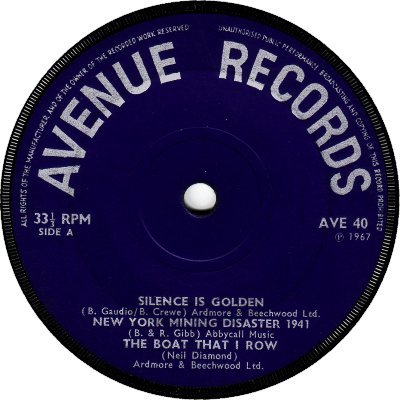
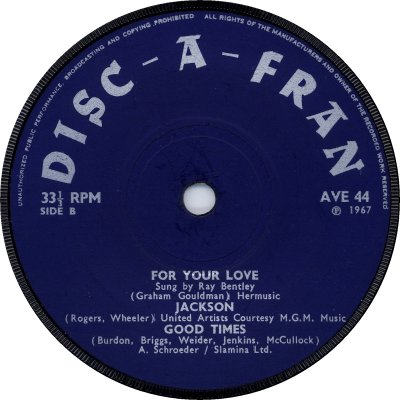
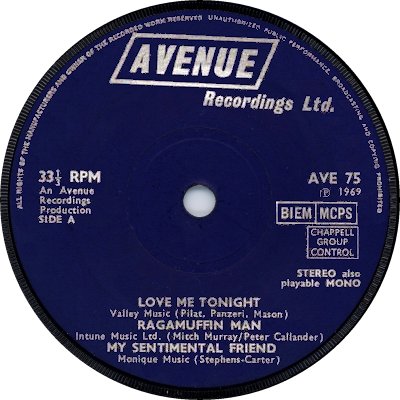
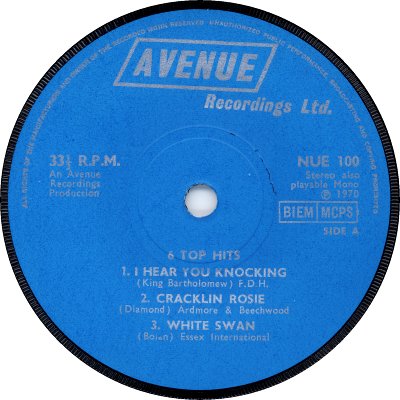
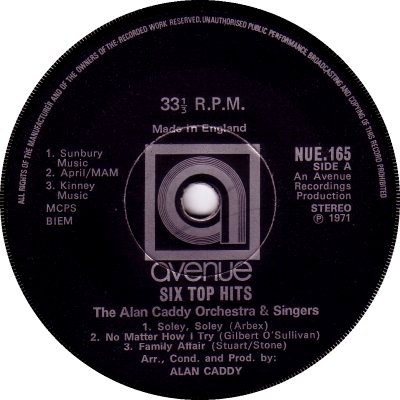
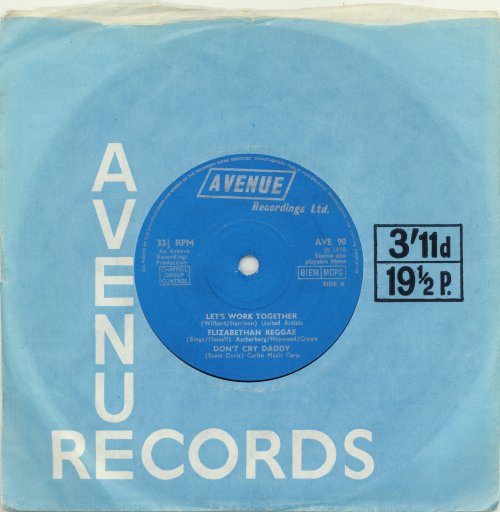
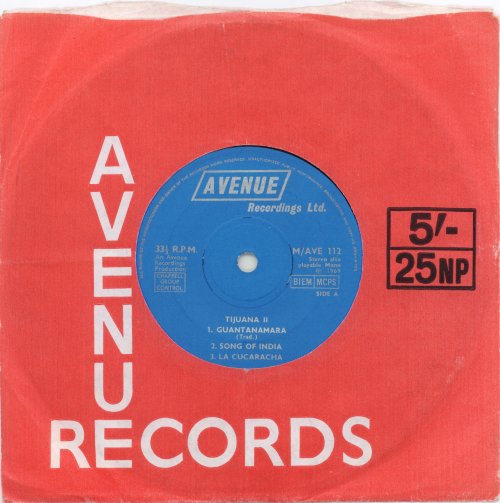
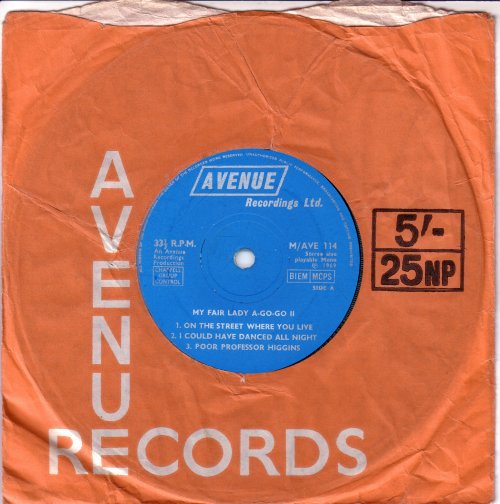
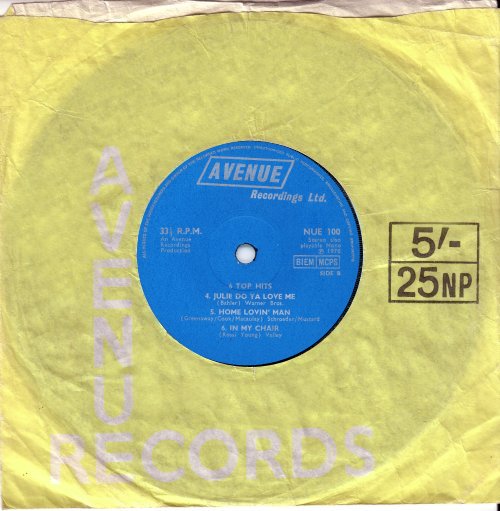
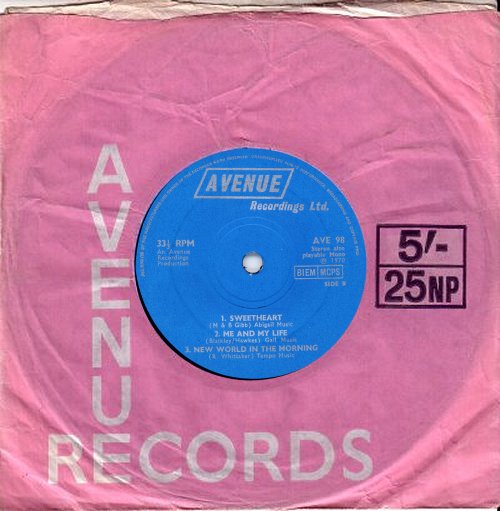
Avenue was a London-based independent company; it was run by Gordon Melville, and it operated from premises in Chingford Mount Rd, E4. From 1967 into the early '70s it issued budget-priced LPs and EPs of Easy Listening material and cover versions of Pop songs. Avenue's chief mover musically was ex-Pirate and Tornado Alan Caddy. Various famous artists, such as Elton John, appeared anonymously on Avenue records; admittedly before they became famous. 'Record Retailer' of the 6th of April 1967, reporting on the forthcoming demise of Bill Wellings's 'Top Six' series of cover-version EPs, said that the Avenue company had been distributing them since Top Six's split with Pye the previous year, which indicates that Avenue had been around for at least twelve months at that point; a later 'RR', of the 4th of October 1969, said that Avenue had been specializing in the 'covers' market for five years, which suggests that the company had started providing covers material for other companies in or around 1964. The article in 'RR' of the 6th of April claimed that the final Top Six EP would be SIX-38, which would be out that week; it added that Avenue intended to start its own series of six-track EPs at the end of the month, presumably to fill the gap in the market. Negotiations were under way with Pye for manufacture, but distribution would be done by a company that didn't usually handle records. The following week, 'RR' (13th April) revealed that a Finchley-based company which it called 'Discofran' - labels and covers suggest that it was actually 'Disc-A-Fran' - would be taking on the job.
The EPs duly began to appear. The first of them was numbered AVE-39, which suggests that it may have been intended to be a follow-on from the last Top Six EP (in the event there were a few Top Six releases after 38, in contradiction to the 'RR' article). Initially they had silver-on-mid-blue labels with the company's name at the top in an arc (1). After a handful of releases, however, the Avenue name was replaced by 'Disc-A-Fran' (2); the catalogue number series continued unchanged, except that some issues were given a preliminary 'D/', making the prefix 'D/AVE'. The 'Disc-A-Fran' label seems to have survived for a mere eight or nine issues, (D/)AVEs-43 to 51, after which the name reverted to Avenue - some releases can be found with either label. Several Disc-A-Fran EPs also appeared on a 'Take 6' label, with the occasional track changed; the catalogue series used by Take 6 records, T/AVE-600, suggests that that company was linked to Avenue, but the sleeves give it as being run by Mike Pemberton at Metropolitan Record Distribution, London W1. In 1968, in or around AVE-56, the arched name on Avenue EPs was replaced by one in a box (3); the following year, with AVE-76, the mid-blue changed to light blue (4). Late on, in 1971, a more imaginative design, in silver-on-black, was adopted (5); AVE-156 was the first of the series to carry the new labels. Company sleeves, when they were used, came in a variety of pastel colours.
Avenue enjoyed a couple of years as a prolific budget-priced EP and LP label. Then, in the issue of the 4th of October 1969, 'RR' revealed that it had plans to enter the full-priced-record market. The label was to have the same name as the cut-price one, 'Avenue', and its launch was planned for the 1st of October. The first four singles were intended to be 'Promises' by Carmen (?), 'My Cherrie Amour' by Lorrie Park, and a couple by The Kydds and Jeff Collins. According to the article Avenue's version of 'Walk Away Renee' was No.1 in Iceland that week, and one of its recordings, 'Come Back Shake Me' by Strawberry Fair, was selling well in Australia at the time. The launch failed to happen as planned, and none of the four singles appeared, but a full-price label, 'Phoenix' (q.v.), made its debut early in 1970. 'RR' of the 12th of December 1969 announced that Avenue records were now available to the trade, and said that up till that point they had been sold through Tesco and similar outlets. The company ran into trouble with its 'Best of Tom Jones, Vol. 1' EP: 'RR' of the 30th of January 1971 reported that the record had been withdrawn after complaints from MAM that attempts were being made to pass it off as an actual Tom Jones product. 'RR' of the 5th of June 1971 provided the information that all Avenue records were being recorded at the Pye studios and were being pressed by Pye at its Tranco plant; Gordon Melville was still in charge, and a 'Mini LP' was coming out every fortnight.
The end was in sight for Avenue as an EP label. 'RR' of the 12th of February 1972 revealed that the company's 'Six Top Hits' EPs would be coming out on a new label, 'Forest' (q.v.) from the 1st of March, and that Avenue was negotiating for its records to be made available through conventional record outlets as an alternative to the likes of Tesco. 'RR' of the 8th of April was able to reveal that a pressing and distribution deal had been signed with Pye, effective from the 14th of that month; it also broke the news that the company was to launch a second full-price label, 'Fury', in partnership with singer Billy Fury and his manager Hal Carter. The first Fury single was due out on the 14th of April and would retail at 49p. The agreement with Pye was destined to be short-lived, however. 'RR''s successor, 'Music Week', of the 22nd of July, reported that the Avenue and Forest labels would no longer be available via Pye, their parent company having opted to go for self-distribution; in future they would be handled by Avenue Recordings (Sales). Fury remained with Pye. By this point Avenue EPs were a thing of the past, all 7" product being issued on Forest. 'MW' of the 29th of June 1974 carried the news that another distribution deal had been arranged, this time with Enterprise, but by that time all of Avenue's product was in the 12" LP format. I have yet to find any Avenue record issued after 1974.
Numbering was initially in the AVE-00s; this changed to NUE-100 in 1970 (3), presumably to avoid confusion with a M/AVE-100 series (sometimes MAVE-100) which had been running alongside the main series since 1968. The AVE series was used for the 'covers of six current hits' EPs, while the M/AVE one was for other material. The M/AVEs were discontinued at some point in 1970, and from then on both kinds of material shared the NUE-100 series; reissues or re-pressings of old M/AVE records sometimes led to picture sleeves having NUE numbers while the records inside them had M/AVE ones. To complicate matters further, the names of EPs were often given differently on the sleeve and the record: to take but one example, NUE-138 had 'Groovin'' on the cover and 'Soul Vol 1' on the label. There were a couple of EPs in an LDO-00 or LD-000 series in 1969, made by singers who were contracted to Avenue, and a 1968 EP of Beatles covers had its own separate number, B/AVE-100. Manufacture of those EPs that I have seen in the vinyl was by Pye. The discography below only covers the 1970s; it owes a considerable debt to the much more comprehensive one which can be found on the Spanglefish site - a site dedicated to budget recordings - which gives illustrations and full track listings and is highly recommended.
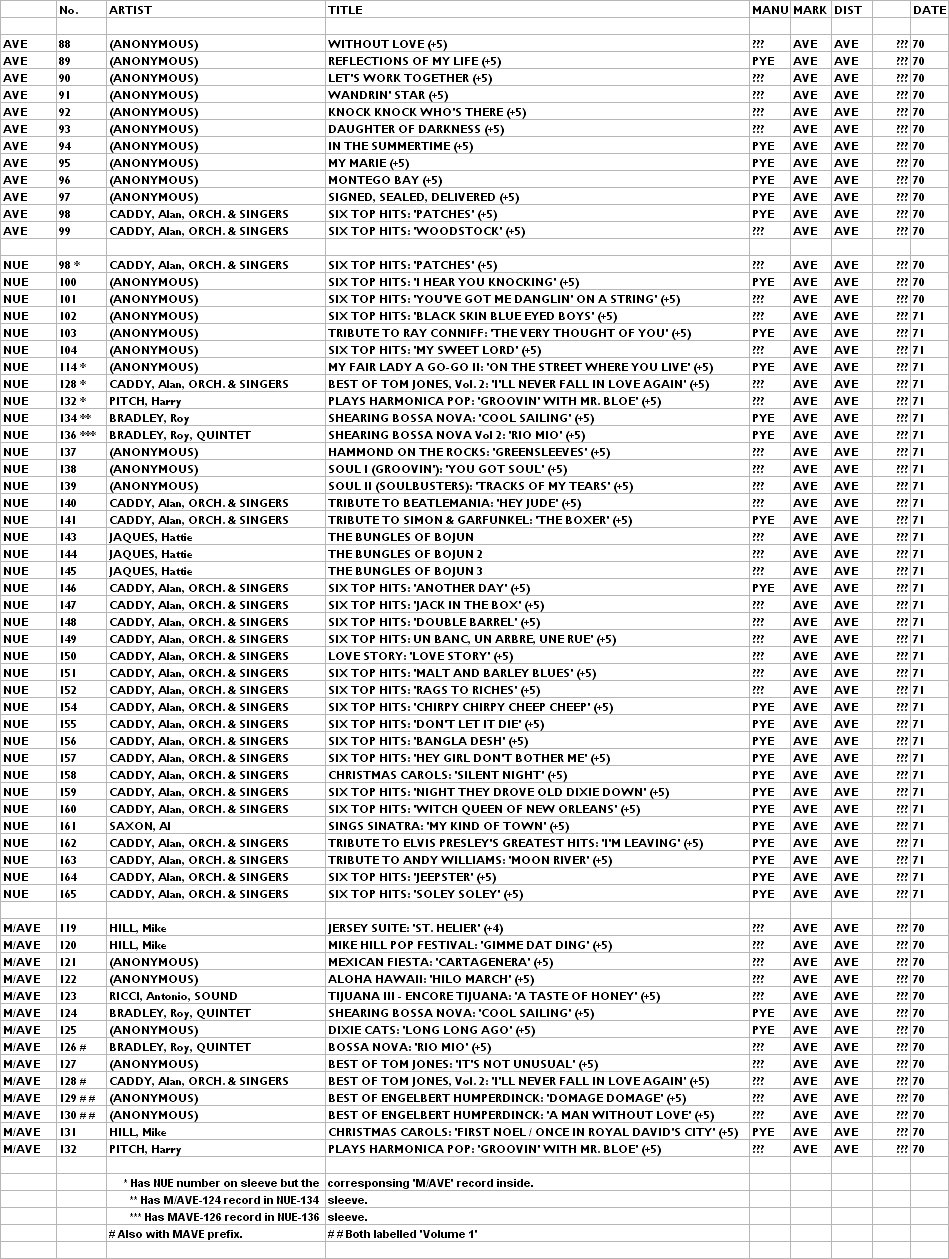


Copyright 2006 Robert Lyons.

